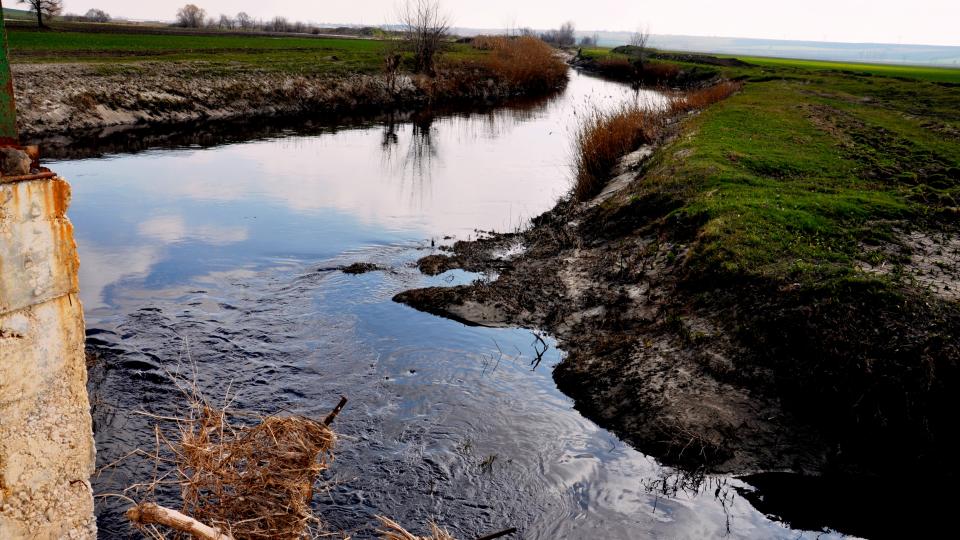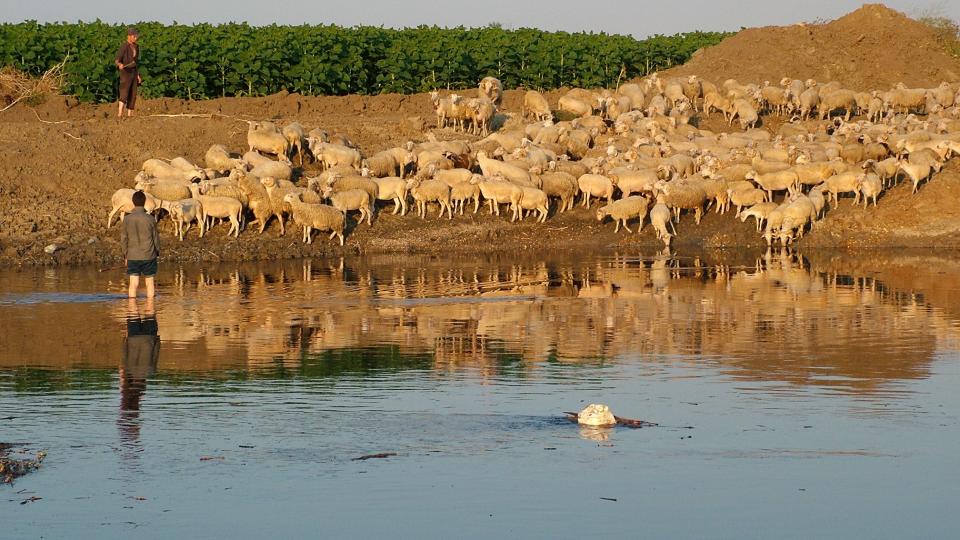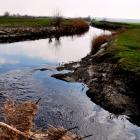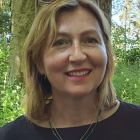The Ergene River has a length of 283 km within the European part of Turkey, which is also known as the Thrace Region, and its river basin area is 14,945.85 km2 that consists of agricultural lands noted for high fertility. It is born from Tekirdag, one of the three provinces of the region; passes through Kirklareli; and unites with the Evros River, the transboundary water connecting Greece and Turkey, in Edirne. Both rivers disembogue themselves into the Aegean Sea from the Saros Bay, which became one of the eighteen specially protected environment areas in 2010 due to its considerable biological diversity and seawater quality. However, the anti-ecological practices induced by industrialization and urbanization policies since the 1970s have had hazardous effects on the Ergene River ecosystems entirely, and particularly on the ground and surface waters. As a petition signed by four village headmen from Cerkezkoy (Tekirdag) addressing the General Directorate of State Hydraulic Works (Devlet Su İşleri Genel Müdürlüğü, DSİ) indicates, industry-related water pollution—mainly from the textile industry—was recorded as early as 1978. Elsewhere, I have analyzed these problems affecting the Ergene River from an ecological security perspective (Dedeoğlu 2010, 2013). Benefitting from the related literature that has emerged since then, I aim to focus here on the pollution of the Ergene River as an outcome of the hegemonic cosmology in Turkey.
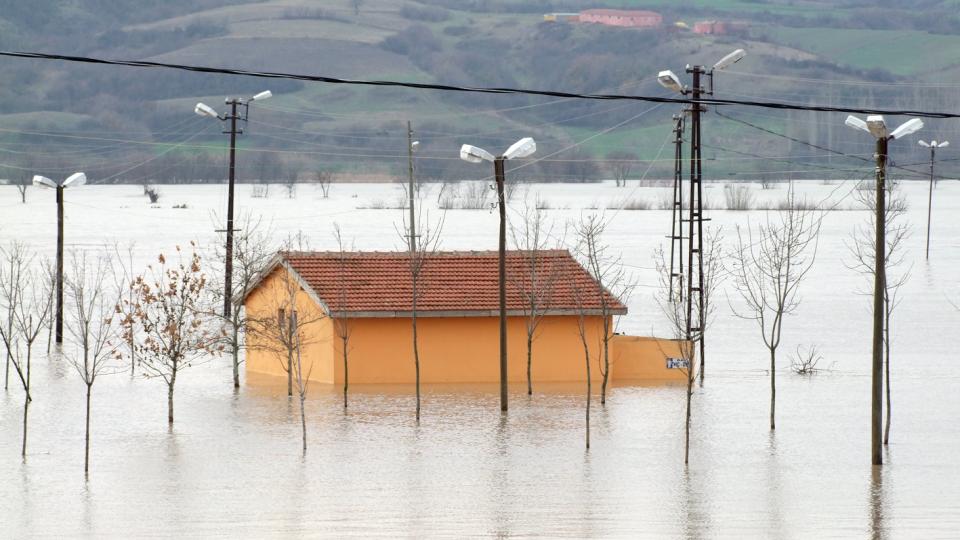
Agricultural lands and chemical contamination resulting from floods, Pehlivanköy (2010).
Agricultural lands and chemical contamination resulting from floods, Pehlivanköy (2010).
Photograph by Hakan Dedeoğlu.
Used by permission.
The copyright holder reserves, or holds for their own use, all the rights provided by copyright law, such as distribution, performance, and creation of derivative works.
Two assumptions. First, cosmology does not stand here for a theory of the universe, but for what a culture contains in an anthropological sense (e.g., Sideris 2015). Each cosmology enables some ontological, epistemological, and axiological positions, and ignores others. For instance, if common sense says that human being is God’s best creation and superior to other species, this makes the adoption of biocentric ethics (axiology) difficult. Also, dogmatic and fatalistic tendencies may undermine environmental attitudes. In a similar vein, being a citizen of and educated in the modern, capitalist, nationalist state system may lead to the rejection of ecological security discourse. Indeed, governments continue to popularize the national security discourse, yielding militarization and commodification of its subjects—no matter if they are human or nonhuman. Second, this study acknowledges that any culture contains various subcultures. However, hegemonic cosmology provides the basis for the regime of truth that frames the norms, governs the everyday lives, and justifies the marginalization of different understandings. In this sense, governance practices in Turkey take place within the hegemonic cosmology transformed by the neoliberal deregulations.
Viewed from this conceptual perspective, the reasons behind the problems of the Ergene River Basin are not entirely different from the other twenty-five river basins of Turkey, but its proximity to Istanbul, the country’s most populous city, has resulted in a more direct negative experience of the hegemonic cosmology. Due to space limitation here, I share two reflections regarding this experience. Scientific research shows that the brutal industrialization in the Thrace region has caused heavy metal pollution in the Ergene River (Güneş, Güneş, and Talınlı 2008) and one of these heavy metals, cadmium, is a risk factor for prostate cancer (Goyer, Liu, and Waalkes 2004). However, the neoliberal fatalism prevents the identification of these causal links in Turkey. To zoom further into the cosmology, the prevailing religious interpretation says that all nature, including water “sources,” is for the benefit and exploitation of humans. Accordingly, the World Values Survey 2014 Turkey data indicates that 35.2 percent of respondents strongly agree, and 35.1 percent agree with the statement “whenever science and religion conflict, religion is always right” (Inglehart et al. 2014). If this is the case, how would this 70.3 percent think of the Ergene River pollution? The elected local officials’ (anti-)environmental attitudes might answer this question.
Although they represent different political ideologies, the elected members of the provincial council (il genel meclisi), the decision-making body of the special provincial administrations (il özel idaresi) in the Thrace region, do not significantly differ from each other when it comes to the political ecologies of the Ergene River Basin. For example, 24 members out of 26 voted “YES” to approve the Kirklareli Special Provincial Administration’s (SPA) participation in the establishment of the Buyukkaristiran Organized Industrial Site. The two “NO” votes insisted that there is no measure in the environmental plans of 1:100000 and 1:25000 to deter industrial sites from polluting the environment (Kirklareli Il Ozel Idaresi 2014). However, the majority decision did not reflect this concern. This decision, among many others, shows that the political composition of the Kirklareli SPA (16 members from the People’s Republican Party, CHP; 7 members from the Justice and Development Party, AKP; 1 member from the Nationalist Movement Party, MHP; 1 member from the Democratic Party, DP; and 1 independent member) does not make any difference in environment related matters.
To conclude, governance itself becomes a problem under the circumstances yielded by people acting within the hegemonic cosmology. This cosmology guides the political-economic decisions in the region and determines the fate of the Ergene River. The actions sometimes take neoliberal and sometimes neofascist forms, but always rely on the hegemonic cosmology. To analyze this further, environmental humanities research on the pollution of the Ergene River should broaden and deepen through interdisciplinary and transdisciplinary perspectives.
How to cite
Dedeoğlu, Çağdaş. “Cosmology of the Ergene River Pollution.” Environment & Society Portal, Arcadia (Autumn 2019), no. 38. Rachel Carson Center for Environment and Society. doi.org/10.5282/rcc/8879.
ISSN 2199-3408
Environment & Society Portal, Arcadia
 This work is licensed under a Creative Commons Attribution 4.0 International License.
This work is licensed under a Creative Commons Attribution 4.0 International License.
2019 Çağdaş Dedeoğlu
This refers only to the text and does not include any image rights.
Please click on an image to view its individual rights status.
- Dedeoğlu, Çağdaş. Güvenliğin Doğası Doğanın Güvenliği. Istanbul: Paraf Yayınları, 2013.
- Dedeoğlu, Çağdaş. “Türkiye’de Çevre-Güvenlik İlişkisinin Ergene Havzası Örneği Üzerinden İncelenmesi.” MA diss., The Institute for Security Studies. Istanbul: Turkish War Colleges Command, 2010.
- Goyer, Robert A., Liu, Jie, and Michael P. Waalkes. “Cadmium and Cancer of Prostate and Testis.” BioMetal 17 (2004): 555–58.
- Güneş, Elçin H., Güneş, Yalçın, and İlhan Talınlı. “Toxicity Evaluation of Industrial and Land Base Sources in a River Basin.” Desalination 226, no. 1–3 (2008): 348–56.
- Inglehart, R., C. Haerpfer, A. Moreno, C. Welzel, K. Kizilova, J. Diez-Medrano, M. Lagos et al., eds. World Values Survey: Round Six—Country-Pooled Datafile, v2018-09-12. Madrid: JD Systems Institute, 2014.
- Kırklareli İl Özel İdaresi. “2014 Yılı İl Genel Meclisi Şubat Ayı Karar Özetleri.” Retrieved on 4 September 2019.
- Sideris, Lisa. “Science as Sacred Myth? Ecospirituality in the Anthropocene Age.” Journal for the Study of Religion, Nature and Culture 9, no. 2 (2015): 136–53.



